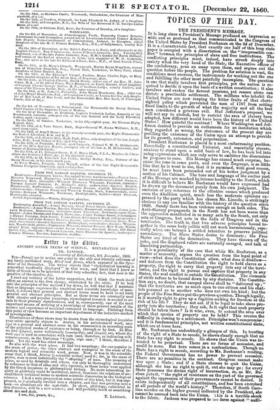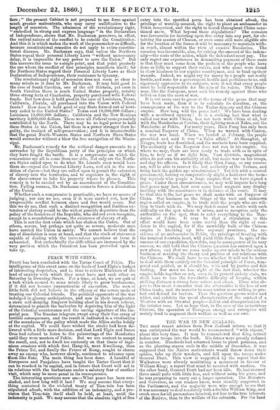TOPICS OF THE DAY.
THE PRESIDENT'S MESSAGE.
IT is long since a President's Message produced an impression so wide and so profound as that communicated to the Congress of the United States by President Buchanan on the 3d of December. It is a characteristic fact, that exactly one half of this long state paper is occupied with a dissertation on the "irrepressible con- flict" between the principles of slave and free institutions. The conflicting principles must, indeed, have struck deeply into society when the very head of the State; the Executive officer of the confederacy, pens an essay upon them, and argues out the question before the people. The problem for solution is vast, the conditions most onerous, the instruments for working out the one and fulfilling the other most painfully incomplete. The question is one that really involves first principles yet the nation is re- quired to decide it upon the basis of a written constitution ; it also involves and evokes the fiercest passions? yet reason alone can dictate a practicable settlement. The millions who inhabit the United States are now reaping the bitter fruits of that short- sighted policy which prevented the men of 1787 from setting fixed limits to the growth of what the majority and all the best men considered a grievous evil. Had Jefferson's proposal, we will not say to abolish, but to restrict the area of slavery been adopted, how different would have been the history of the United States ! How painful the contrast ! Where Washington and Jef- ferson desired to provide an euthanasia for an institution which they regarded as wrong, the statesmen of the present day are periling the existence of the Union upon an attempt to provide for its growth, extension, and perpetuation. President Buchanan is planed in a most embarrassing position, Essentially a constitutional Unionist, and essentially sincere, anxious to stand upon a solid basis of law, he has been led into using expressions which can only serve to embitter the dissensions he proposes to cure. His Message has caused much surprise, be- cause the tone in some parts, and even the ranguao°u is so little like that he is wont to use, that it is surmised, with good reason, he must have been persuaded out of his better judgment by a section of his Cabinet. The tone and language of the earlier part
of the Message are marked b.intense hostility to the North, which it is difficult to believe Mr. Buchanan would have expressed had he drawn up the document purely from his, own judgment. The omission of any reference to the effective causes which produced even the Abolition spirit, much less the moderate opinions ex- pressed by the party which has chosen Mr. Lincoln, is strikingly obvious to any one familiar with the history of the question since 1820. Surely there has been violence enough on both sides. The Anti-Slavery propaganda in the North has not been worse than the aggression manifested in so many acts by the South, not only acts of Congress, but acts in the halls of Congress and in the territories. The truth is, that two adverse principles bound to- gether in the same body politic will not work harmoniously, espe- cially when one betrays a settled intention to preserve political ascendancy. The Slave States desire to dominate ; the Free States are tired of the domination. They have thrown off the yoke, dissolving and the displaced rulers are naturally enraged, and talk of olving partnership.
It is a peculiarity of the case that while Mr. Buchanan, as a matter of necessity, argues the question from the legal point of view—what does the Constitution allow, what does it disallow— and deduces from the Constitution the right to hold slaves as a property, the right to carry that property into any of the terri- tories, and the right to pursue and capture that property in any States, the real conflict is outside the Constitution. The elements of strife refuse to be bound down by any doctrine. The Constitu- tion says, no doubt, that escaped slaves shall be " delivered up ; " that the territories are as much open to one citizen and his chat- tels personal as to ,another who does not own his kind ; but the people of the Free States put the previous question. Though legally, is it morally right to give up a fugitive seeking for freedom at the risk of his life ? They do not ask if it be legal to take slave pro- perty into the territories ; they ask, Is it right that such property should be taken there ? Is it wise, even, to extend the area over which that species of property can be held ? This creates the difficulty in coming to a settlement. Principles won't compromise ; and it is fundamental principles, not written constitutional dicta, which are at issue here.
Mr. Buchanan has undoubtedly a glimpse of this. In treating of the right of a State to secede, he shows clearly enough that no State has any right to secede. he shows that the Union was in- tended to be perpetual. There are no forms of secession, and could be none. But here comes in a contradiction. Though no State has a right to secede, according to Mr. Buchanan's readixtg, the Federal Government has no power to prevent secession. There are no penalties in the contract. Congress cannot make war upon a State ; and if a State chooses to quit the Union, although she has no right to quit it, out she may go ; for every State possesses the divine right of insurrection, or, as Mr. Bu- ehan puts it, " the right of resistance on the part of the governed against the oppression of their governments cannot be denied. It exists independently of all constitutions, and has been exercised at all periods of the world's history." Therefore, if South Caro- lina secedes on the higher ground indicated by the President, she cannot be coerced back into the Union. this is a terrible shock to the fabric. Jackson was prepared to use force against " nulli- fiers ; " the present Cabinet is not prepared to use force against much greater malcontents, who may carry nullification to the length of secession. The admission of the revolutionary right, " embodied in strong and express language" in the Declaration of Independence, shows that Mr. Buchanan perceives, in effect, the radical nature of the conflict to be outside the Constitution. And this it is which makes the work of the peacemaker so difficult, because constitutional remedies do not apply to extra-constitu- tional diseases. Mr. Buchanan says, that unless the Northern States repeal their personal Liberty Laws " without unnecessary delay, it is impossible for any power to save the Union." But this narrows the issue to a single point, and that point precisely the one where the conflict of first principles manifests itself; for the Northern States regard their Personal Liberty Laws as their Declaration of Independence, their resistance to tyranny. The revolutionary right of secession does not seem so clear to many minds as it does to Mr. Buchanan. It may hold good in the case of South Carolina, one of the old thirteen, yet even in South Carolina there is much United States property, notably three strong forts at Charleston, property purchased with Federal funds. But how does it held good in the case of Louisiana, Texas, California, Florida, all purchased into the Union with Federal funds ? How does it hold good of any State formed out of terri- tory ceded to the United States? Texas cost 10,000,000 dollars ; Louisiana 15,000,000 dollars ; California and the New Mexican territory 3,000,000 dollars. These were all Federal moneys mainly contributed by the North. There may be no legal power to hold these States in the Union, but there is a power stronger than le- gality, the instinct of self-preservation ; and it is inconceivable that the great North-Western States and Northern Slave States would surrender without a blow the free navigation of the Missis- sippi. Mr. Buchanan's remedy for the national danger amounts to a surrender by the Republican party of the principles on which they have fought the battle. It is a compromise on which the concessions are all to come from one side. Not only are the North- ern States called upon to do what Mr. Lincoln even would have them do—repeal the Personal Liberty Laws, and aid in the ren- dition of slaves—but they are called upon to permit the extension of slavery into the territories, and to acquiesce in the right of the slave-owner to take his property where he pleases. This remedy is to be carried out by an amendment of the Constitu- tion. Failing success, Mr. Buchanan seems to foresee a dissolution of the Union.
Whether such a compromise is practicable, we have no means of judging ; nor can we see, even if it were carried out, how the irrepressible conflict between slave and free would cease. But this we do see, that such a distinct recognition and limitless ex- tension of slavery would be the widest possible departure from the policy of the founders of the Republic, who did not even recognize, except in a roundabout phrase, the existence of slavery at all. This is not the first crisis which has shaken the Union. Out of others, severe, but perhaps not quite so severe, moderate men have carried the Union in safety. We cannot believe that the day of dissolution is near at hand, and that the stock of statesmen capable of dealing with the tremendous questions at issue is exhausted. But undoubtedly the difficulties are increased by the -very positian which the President has been prevailed upon to take up.



























 Previous page
Previous page